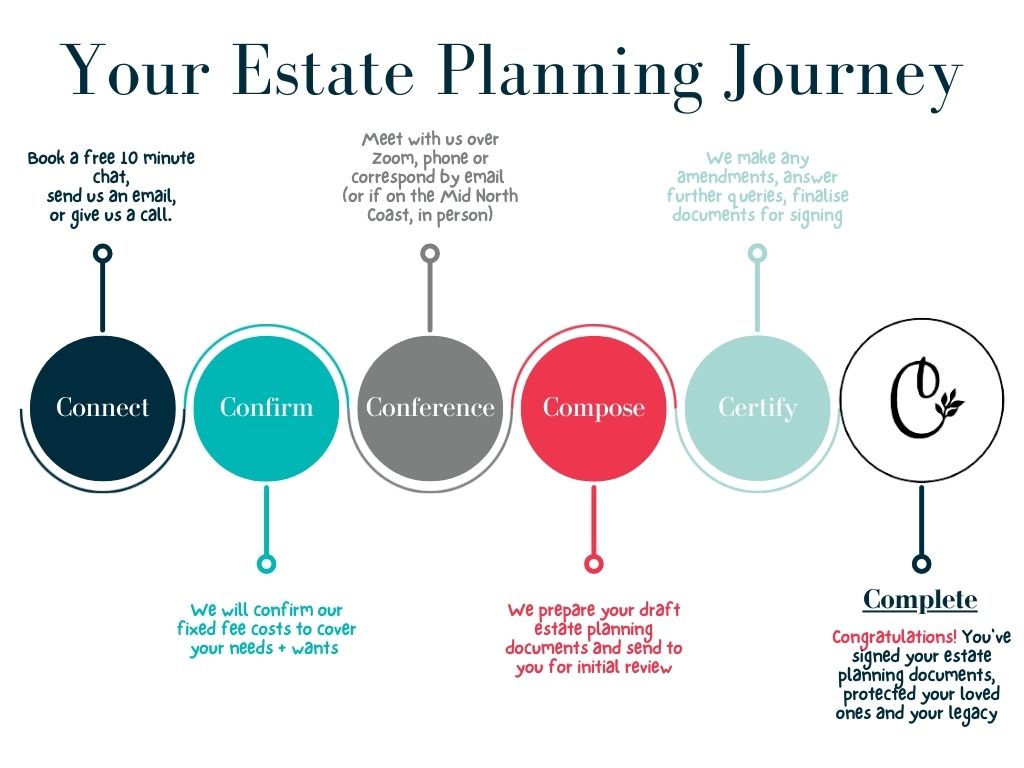
Estate Planning
Estate Planning Lawyer.
In a nutshell.
Estate Planning in NSW is generally made up of 3 legal documents; you guessed it – Wills, Powers of Attorneys & Enduring Guardianships.
They are all about looking after yourself and your family. Because that’s the most important thing, right? You want what’s best for your family. It is better to plan than to be blindsided. Hence the term, estate planning. Life (and death) is what you make it, so plan accordingly.
Estate planning documents can only be done while you have sufficient mental capacity. Protect yourself and your family by having the tools in place to weather any storm – during your lifetime, and after your death.
Got a Will? Need to update it? What happens if you don’t have a Will or your circumstances have changed?
Wills are the legal document that tell the world what happens when you’re gone.
Who will be responsible for looking after your affairs?
Who do you want as guardian of your underage children?
Who do you want to get all the money in your bank accounts and who gets the vase you made in kindergarten?
What ages will your children will be when they inherit?
Will your children have access to monies before they inherit?
Your Will has no effect until you pass away and can be revoked and updated at any time while you have testamentary capacity (legal speak for while you still have your marbles).
Your Will must be correctly signed and witnessed to be a formal, enforceable Will in NSW.
If you have no Will, NSW intestacy laws will apply. This means the law will choose who your beneficiaries are and what they will be entitled to. Certain life events like marriage, divorce or selling off assets can invalidate part of or all of your Will.
It is important your Will is kept up to date.
Powers of Attorney are designed to look after your assets and finances if you can’t.
There are 2 types of Powers of Attorneys:
General Powers of Attorney & Enduring Powers of Attorney.
General Powers of Attorney appoint attorney(s) to stand in your shoes and sign financial documents on your behalf ONLY while you have mental capacity.
Enduring Powers of Attorney appoint attorney(s) to sign financial documents for you even after (or if) you lose mental capacity.
These documents can be essential when you need someone to assist if you have practical difficulties signing documents for a financial matter (e.g. while on holidays) or if you are infirm or incapacitated and cannot sign documents.
Enduring Guardianships are the ultimate safety net document for peace of mind for a time when you can’t make medical and personal decisions for yourself.
This document gives your guardian(s) the authority to consent to medical and dental treatment, life extending measures, deciding where you live and what personal services you receive if you are partly or wholly incapacitated – temporarily or permanently – as determined by a medical practitioner.
Advanced Health Care Directives are supplementary to Enduring Guardianship documents in the sense that they can assist your guardian(s) in making decisions but in NSW can’t give legal authority to your guardians to make decisions for you.

Why choose Copeland Estates Legal to be your Wills & Estate Planning Lawyer?
Copeland Estates Legal provides legal advice and documents prepared by an experienced lawyer who deals exclusively in Estate Planning law and Deceased Estates law. You know, the whole life cycle. We take the time to provide you with information, assess your options and provide advice so that you can be sure that your Will reflects your wishes and gives the most effective protection against claim. Preparing Wills is not simply an additional service or an afterthought for us, we take pride in our work and give you the benefit of our years of experience, training and skills. Put simply, we give you our best.
And unlike traditional law firms, we look after you from the comfort of your own home. We are online for your convenience. No need to carve out a section of your busy day to drive to a stuffy lawyer’s office and wait for them to get around to seeing you. We use everyday, accessible technology – such as zoom, phone, email – to meet you, get to know you, answer your questions and provide you with the right legal advice and prepare the right legal documents to make sure your loved one’s wishes are carried out.










